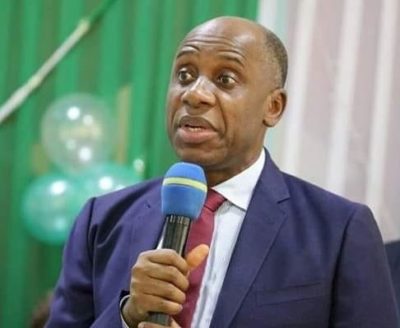
Minister of Transportation, Rotimi Ameachi, has called for a concerted cooperation among countries in the West and Central Africa sub-region to develop a blueprint and agree on a common approach in mainstreaming the maritime sector into the 2030 agenda for Sustainable Development Goals (SDGs) and national plan of member states.
Ameachi gave the advice in Lagos on Monday, when he declared open a regional workshop on United Nations Sustainable Development Cooperation Framework: A Process to Mainstream the Maritime Sector’, organised by the International Maritime Organization (IMO) and the United Nations Economic Commission for Africa (UNECA) with the support of the Nigerian Maritime Administration and Safety Agency (NIMASA).
The workshop, which is fourth in the series following a similar event in Chile, Bagkok and Nairobi, is an initiative of the IMO, designed to help put the maritime sector into the mainstream of plans and initiatives to achieve the global Sustainable Development Goals, agreed by world leaders in 2015.
Represented by the Director General, NIMASA, Dakuku Peterside, Ameachi, noted that as the African Continent moves ahead with phase 11 negotiations for the creation of the African Continental Free Trade Area (AfCFTA), the maritime sector remains critical to seamless trade and effective economic integration between Africa nations.
He said the realization of the SDGs is therefore dependent on the joint effort of Africa countries to put in place the much needed cooperation framework in collaboration with critical stakeholders, “using the maritime sector as a veritable tool to promote agricultural development, food security, industrialization and economic transformation of our nations.”
Ameachi said the maritime transport plan and strategy, which, Nigeria is currently working on with the support of the IMO when completed, will provide a robust enabling frame work for achieving the country’s maritime objectives and inter regional cooperation on sustainable development across the continent.
Earlier in his address, Dakuku, while expressing appreciation to IMO and UNECA for giving Nigeria the opportunity to host the regional workshop decried the poor attention given to the maritime sector by African leaders despite its huge potentials in facilitating economic growth and development.
He said the main objective of the workshop is to help countries in the region focus on the role of maritime sector in achieving sustainable development goals and ensure that countries understand the need and processes of mainstreaming maritime sector into their various economic development plans.
He said, “There is a general understanding that our government do not give the maritime sector priority attention. For example, Nigeria is currently pursuing an economic diversification program. We have taken a number of steps and we have clearly identified where we want to be as a country and pillars upon which we want to build that desirable glorious future, but unfortunately, maritime sector is not one of the critical pillars and it is simply a challenge we are here to deal with because leaders don’t understand the dynamics and critical roles maritime transportation plays in facilitating economic growth and development.
“So the IMO seized the initiative of helping nation’s mainstream maritime sector in their sustainable development goals and the economic plan of the various countries. So when we were offered the opportunity to host the regional workshop in Nigeria, we gladly accepted it with bold hands. What we want to achieve is for our leaders to begin to understand the critical and strategic role that maritime transportation can play in facilitating economic growth and why it is important to mainstream maritime sector in economic plan and strategies of our countries.”
Director, Technical Cooperation Division, IMO, Juvenel Shiundu, said IMO is working with member states to assist them achieve the UN SDGs towards the implementation of the 2030 agenda and ensure that the maritime sector is given due consideration in their national development plans.
“At the moment, if you look at the national development plans of African countries, you will find out that the maritime sector is not reflected and yet the sector contributes 90 percent of international trade. Part of what IMO is doing is the organization of a workshop like this. When we bring all the stakeholders together, then they will realize the importance of trying to ensure the maritime sector is given the right attention it required from the political leadership,” he said.
